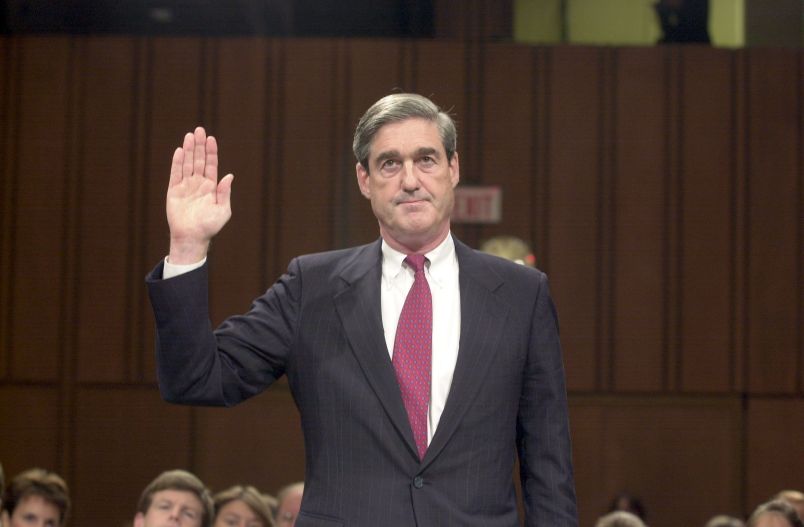The news that the controversial Nunes memo accuses Deputy Attorney General Rod Rosenstein of misconduct underscores a crucial but often overlooked reality about Robert Mueller’s investigation of Russian influence in the election: If Mueller decides that President Donald Trump obstructed justice or otherwise broke the law — and such would have quite a bit of evidence — he may well still need Rosenstein’s sign-off to do anything about it.
The pivotal position Rosenstein occupies may help explain the determination of many Trump loyalists in and out of Congress to release the Nunes memo. Rosenstein has been facing calls since last year to step down or recuse himself from the Mueller probe — and his replacement would likely be a Trump loyalist. That means that if Rosenstein is forced out and a Trump loyalist takes his place, the move could neuter the Mueller probe.
At the heart of the issue are limits on the powers of the special counsel. Many legal scholars believe a sitting president can’t be criminally indicted, meaning that if Mueller finds evidence of crimes by Trump, his strongest recourse might well be to make a referral to Congress for potential impeachment proceedings. But some of those experts tell TPM that under the regulation governing the special counsel’s office, Mueller lacks the authority to make that referral without approval from Justice Department officials overseeing his investigation.
After Kenneth Starr’s pursuit of Bill Clinton, Congress changed the laws governing special investigations in 1999: No longer could a three-judge panel appoint an “independent counsel” acting with no direct DOJ oversight. Instead, the decision to appoint a “special counsel” had to be made by the attorney general. In Mueller’s case, Attorney General Jeff Sessions recused himself, because of meetings he had held with the Russian ambassador, leaving Rosenstein to appoint and manage Mueller and his probe.
“Those regulations don’t explicitly give the special counsel authority to make a referral,” William Yeomans, a 26-year DOJ veteran who has served as an acting assistant attorney general and is now a fellow at the Alliance for Justice, told TPM. “If there is a referral, it’s going to have to go through Rosenstein. Ultimately, it’s probably his decision.”
Susan Low Bloch, professor of constitutional law at Georgetown Law School, agreed. “Rosenstein decides what to do, and if he sees an impeachable offense I would say that he should send it to Congress,” she said in a phone interview on Monday. “But if he chooses not to, I don’t think you can do anything.”
If Rosenstein is fired or steps down, Trump would appoint his successor. And if Rosenstein recuses himself, the ranking official in the department of justice (DOJ) would be Rachel Brand, a Republican legal operative who worked in the George W. Bush White House*. Brand then would decide whether or not to send Mueller probe’s findings against the president, if any, to the House.
The memo, authored by the office of Rep. Devin Nunes (R-Calif.), reportedly claims Rosenstein approved an FBI application to a secret court administering the foreign intelligence surveillance act (FISA). The application sought a warrant that reportedly was used to eavesdrop on Trump campaign staffer Carter Page, who has a web of ties to Russia. The memo says the application failed to tell the judge that it relied on a controversial intelligence dossier compiled by former British spy Christopher Steele.
As early as last June, Sean Hannity of Fox News, a key Trump defender, called on Rosenstein, along with Mueller, to resign, and Trump expressed displeasure with him in an interview with the Times where he expressed suspicion over Rosenstein’s background in historically Democratic Baltimore. CNN reported that Trump had threatened to fire Rosenstein in private over the weekend: “[L]et’s fire him, let’s get rid of him,” advisors told the network Trump had said, though they characterized the outbursts as “mostly bluster” according to the report. Rosenstein himself has threatened to quit in response to efforts by Trump to pin the blame on him for the firing of Jim Comey, the former FBI director.
Further complicating the situation is the fact that Rosenstein is a potential witness to an obstruction of justice case against Trump. Rosenstein wrote the memo justifying Comey’s dismissal, which appears to have misrepresented Trump’s reasons for getting rid of him: The memo said Trump fired Comey because Comey publicly released details of the FBI’s investigation of Hillary Clinton — less than a month later, Trump told NBC that he fired Comey because he thought the Russia investigation was bogus. In the interim, the White House tried to pin the firing on Rosenstein himself, who reportedly threatened to resign in protest.
As a result, Yeomans said Rosenstein should recuse himself from the probe.
“One of the principles of the Justice Department is that you can’t supervise an investigation in which you are a witness,” Yeomans said. “Rosenstein has been the man in the spotlight. Mueller may want to keep him there, I don’t know, but it’s clear that he’s key to the investigation.”
What’s also clear is that the question of Rosenstein’s job security is crucial — and it underscores how much is at stake in the Republican effort to use the Nunes memo to discredit him.
Correction: Because of an editing error, this story originally reported that Rachel Brand is perceived as a Trump loyalist. In fact, there’s no evidence for that characterization of Brand’s views.







So Lindsey Graham, how about expanding your proposed legislation to protect BOTH Mueller & Rothenstein?
We’re waiting for you to come out, with it.
What a shithole.
Dysfunctional much?
I hate these articles, because sometimes I think they’re giving them ideas…
Then again - by publicizing it, all hell will break loose if he does it…
As always, the republican cabal chooses to defend its criminal president rather than the US Constitution. The oath of office means absolutely nothing anymore. We are no longer a nation of laws, and sadly, not even a nation of honorable men.